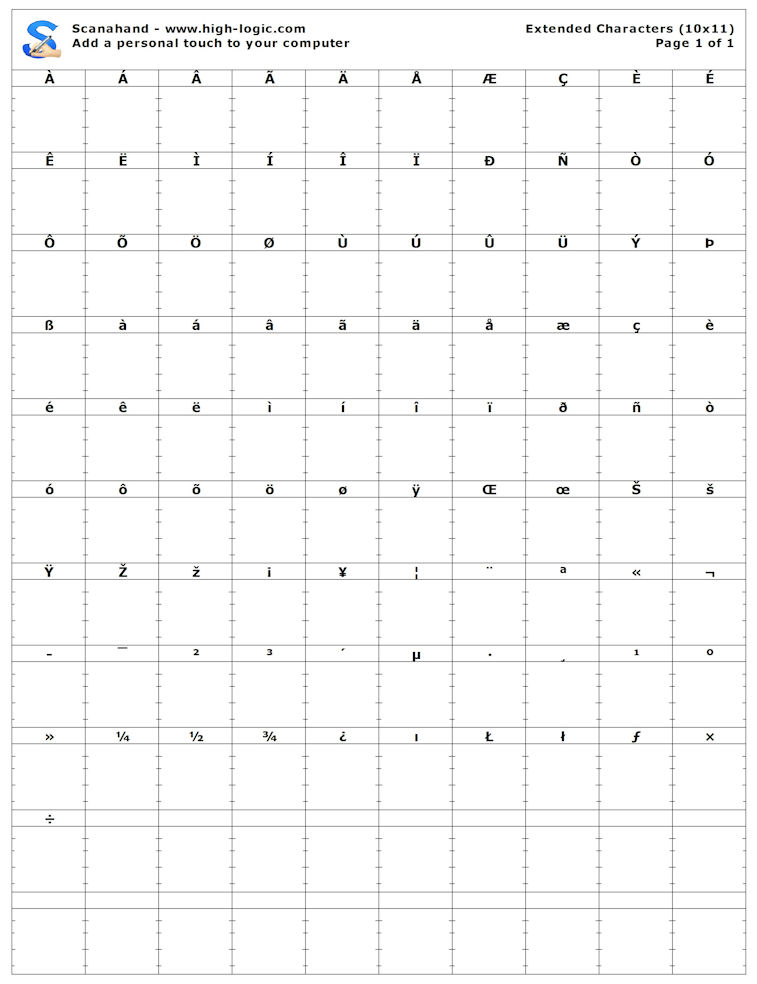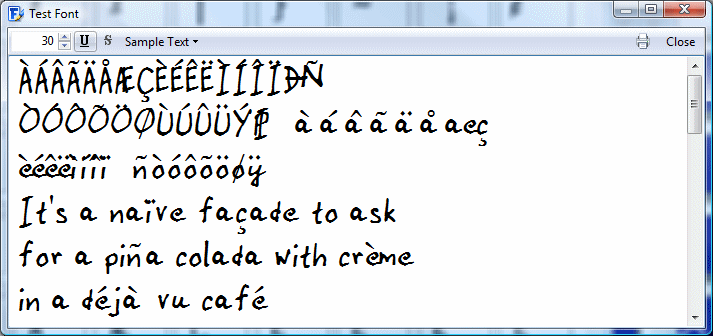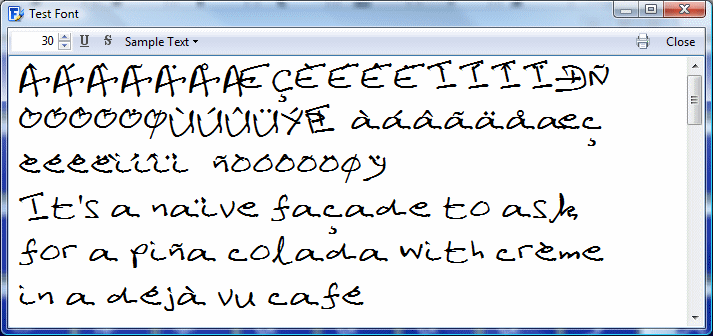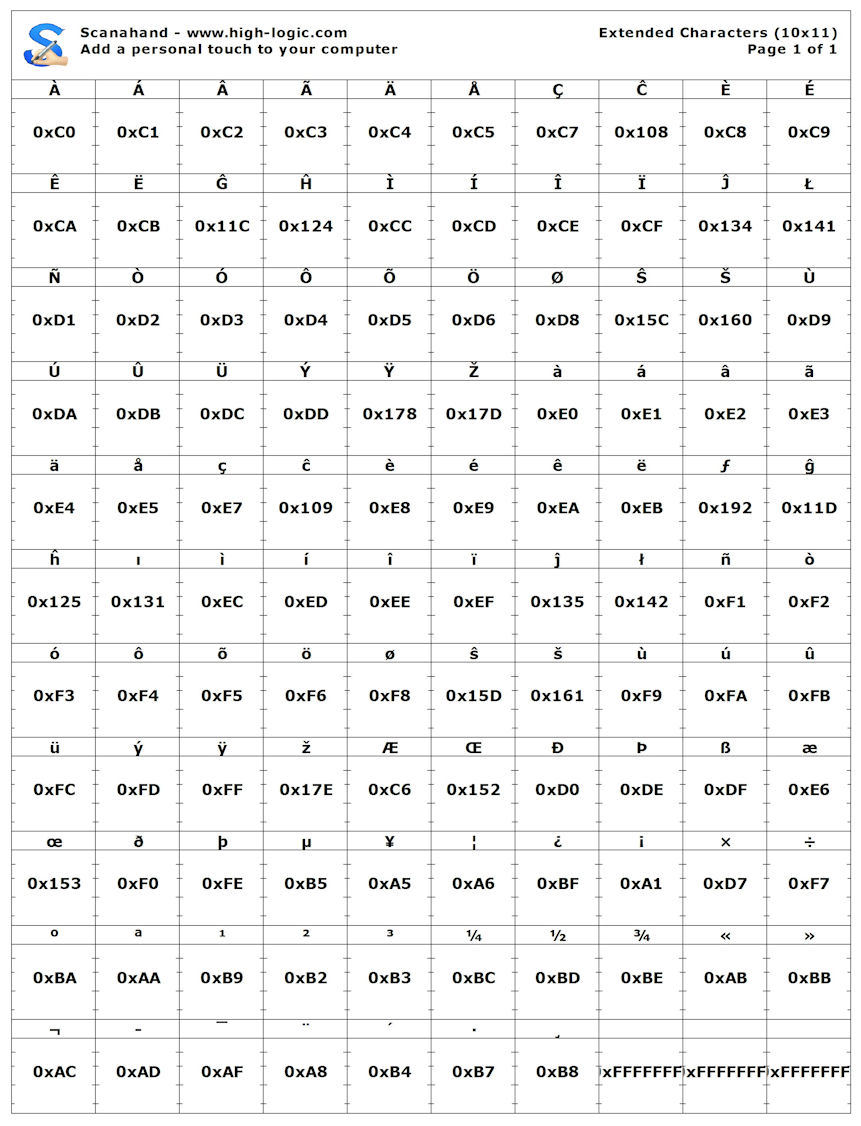Page 1 of 4
Diacritical Marks, respectively Unicode
Posted: Tue Mar 11, 2008 11:59 pm
by mklaey
Hi
I just downloaded Scanahand, and I also bought a license: This looks to me like a great idea!
The very first trial with this tool worked quite well, but I see that diacritical marks as they are used throughout the world -- except in English I guess --

) are not supported. As a Swiss German language user I need at least ä ö ü and their uppercase equivalents - Ä Ö Ü . and due to the closeness to France, also é è ê and the variations with a, o, and u.
With kind regards
Matthias Kläy
--
www.kcc.ch
Posted: Wed Mar 12, 2008 7:27 am
by Bhikkhu Pesala
Already being thought about for a later version. See
ths thread.
Re: Diacritical Marks, respectively Unicode
Posted: Sun Jun 08, 2008 10:51 am
by Sheitan
Hello,
Scanahand is a rather good product despite it lacks support for foreign languages.
I use it without a scanner, I've exported the template then filled it in my favorite vectorial graphic tool using a pen tablet and once finished exported the filled template and got it back in Scanahand.
This is a bit complex but let's you have very sharp character edges lettin' your font look much clear that a scanned one.
As a french user I strongly agree that Scanahand need support for at least the full basic ANSI character set.
Sheitan


mklaey wrote:Hi
I just downloaded Scanahand, and I also bought a license: This looks to me like a great idea!
The very first trial with this tool worked quite well, but I see that diacritical marks as they are used throughout the world -- except in English I guess --

) are not supported. As a Swiss German language user I need at least ä ö ü and their uppercase equivalents - Ä Ö Ü . and due to the closeness to France, also é è ê and the variations with a, o, and u.
With kind regards
Matthias Kläy
--
www.kcc.ch
Posted: Tue Jun 10, 2008 11:08 am
by Dave Crosby
ä ö ü and their uppercase equivalents - Ä Ö Ü . and due to the closeness to France, also é è ê and the variations with a, o, and u.
I think a check box that would automatically add diacritical marks could easily be made part of the program.
Posted: Thu Jul 31, 2008 12:24 pm
by Erwin Denissen
How about these 91 additional characters, placed on a second template:
ÀÁÂÃÄÅÆÇÈÉÊËÌÍÎÏÐÑÒÓÔÕÖØÙÚÛÜÝÞßàáâãäåæçèéêëìíîïðñòóôõöøÿŒœŠšŸŽž¡¥¦¨ª«¬¯²³´µ·¸¹º»¼½¾¿ıŁłƒ×÷

Then there are still 19 cells empty, so there is still room for more characters.
Posted: Thu Jul 31, 2008 3:43 pm
by Bhikkhu Pesala
Drawing each accented glyph separately is too much work for the user and makes it too difficult to get the base glyphs to match. Composites should be composed from base glyph + accent, then only the accents need to be drawn.
The following accents are needed to cover most languages. (Source:
Letter Database).
Grave, acute, tilde, diaeresis, cedilla, ring, circumflex, caron, breve, macron, ogonek, double acute, dot above (Polish), combining comma above right (Czech), middle dot (Catalan),
Then for those characters that don't work with composites, you need Ææ Øø (for Danish, Norweigan), Ðð Þþ (Icelandic), Łł slash (Polish), Œœ (French), and perhaps a few more.
Posted: Thu Jul 31, 2008 8:08 pm
by Erwin Denissen
Thanks for taking the time to let me know your opinion. It's much appreciated.
Bhikkhu Pesala wrote:Drawing each accented glyph separately is too much work for the user and makes it too difficult to get the base glyphs to match. Composites should be composed from base glyph + accent, then only the accents need to be drawn.
I'm afraid most people will fail to draw them correctly. Besides it takes more time to develop than I can commercially justify. I need a simple straightforward implementation, otherwise I'm forced to cancel the Premium Edition

Posted: Thu Jul 31, 2008 9:04 pm
by Bhikkhu Pesala
I thought that since you already have the code for FontCreator, it wouldn't be as hard to reuse it as to write new code — that proves how little I know about programming.
If users don't know how to draw accents, then they won't know how to draw accented glyphs either. You already have the means to trace the accents and convert them to glyphs, so what's so difficult about making composites or just simple glyphs that reuse the base glyphs?
Posted: Fri Aug 01, 2008 8:38 am
by Erwin Denissen
I thought that since you already have the code for FontCreator, it wouldn't be as hard to reuse it as to write new code — that proves how little I know about programming.
I've copied outlines from a..z and A..Z to a new font i FontCreator and used the complete composites feature to see how it looks. Here are two attempts:


Since the fonts lack a dot less i, the following all contain accents with an overlapping dot: ì í î ï
If users don't know how to draw accents, then they won't know how to draw accented glyphs either. You already have the means to trace the accents and convert them to glyphs, so what's so difficult about making composites or just simple glyphs that reuse the base glyphs?
I think a "handwritten font" looks more realistic when all accented characters that "share" the same base glyph do look different.
Posted: Fri Aug 01, 2008 11:00 am
by Bhikkhu Pesala
The dotless ı would need to be drawn, along with æ and so forth, but I can see that using composites might be problematic with hand-written fonts as the glyphs don't conform strictly to x-height and Caps height. Centering the accents could also give poor results.
Posted: Fri Aug 01, 2008 2:28 pm
by Erwin Denissen
So it will be a second page template that will be made available in the Premium Edition.
I've reordered the characters, and added some more:
ÀÁÂÃÄÅÇĈÈÉÊËĜĤÌÍÎÏĴŁÑÒÓÔÕÖØŜŠÙÚÛÜÝŸŽàáâãäåçĉèéêëƒĝĥıìíîïĵłñòóôõöøŝšùúûüýÿžÆŒÐÞßæœðþµ¥¦¿¡×÷ºª¹²³¼½¾«»¬¯¨´·¸
For my own convenience I've temporarily added the corresponding code points into the cells.

Then there are still 3 cells empty, so there is still room for more characters.
Posted: Fri Aug 01, 2008 4:35 pm
by Jowaco
My view is that, in general, the people choosing to use Scanahand to generate a font will not be interested in making a font for multilingual use involving many accented glyphs. I feel that the typical user will be interested in one particular language and perhaps one or two second languages of other countries. For example, I would only wish to generate a font for use in English, German, French and Swedish and consequently in the page 2 extension template I would only need to draw in a few extra accented characters i.e. I just need to draw the few that I need; the rest can just be left blank. That would not be too arduous. It is, however, very handy to have so many other characters available and other people will, udoubtedly, use a different subset for their particular requirements.
Joe.
Posted: Fri Aug 01, 2008 5:10 pm
by Bhikkhu Pesala
That is a good point. Anyone making multi-lingual fonts should be using FontCreator, not Scanahand, so the most that anyone will need to fill in will be about 40 extra glyphs.
I suppose the thing to do would be to make sure that the premium edition supports every language of users who have purchased Scanahand.
Polish, for example, doesn't seem to be fully supported (no Ogoenk), but has anyone from Poland bought it? I presume that Dutch needs ij and IJ, which also don't seem to be included.
Don't forget the currency symbols: I presume that French users will need the Fr, and Spanish users will need Peseta for example.
Posted: Fri Aug 01, 2008 5:44 pm
by Erwin Denissen
You know I usually don't give sales figures, but I don't mind making an exception every now and then

Bhikkhu Pesala wrote:Polish, for example, doesn't seem to be fully supported (no Ogoenk), but has anyone from Poland bought it? I presume that Dutch needs ij and IJ, which also don't seem to be included.
2 paid customers from Poland so far.
With a two page template it is impossible to fully support all languages, WGL4 supports a lot of common (non CJK) languages and contains over 600 characters. However I agree, some characters might be more useful than some of the characters in the last row.
U breve and u breve are also missing, they are used for Esperanto.
Posted: Mon Aug 04, 2008 11:10 am
by Erwin Denissen
Bhikkhu Pesala wrote:I presume that Dutch needs ij and IJ, which also don't seem to be included.
Most Dutch people have a standard US keyboard, and I've never used the single character ij or IJ in a digital document. Dutch people just type i and j or I and J. Spellings checkers try to be smart, and change "IJsland" (Iceland) into "Ijsland".
 ) are not supported. As a Swiss German language user I need at least ä ö ü and their uppercase equivalents - Ä Ö Ü . and due to the closeness to France, also é è ê and the variations with a, o, and u.
) are not supported. As a Swiss German language user I need at least ä ö ü and their uppercase equivalents - Ä Ö Ü . and due to the closeness to France, also é è ê and the variations with a, o, and u. 


